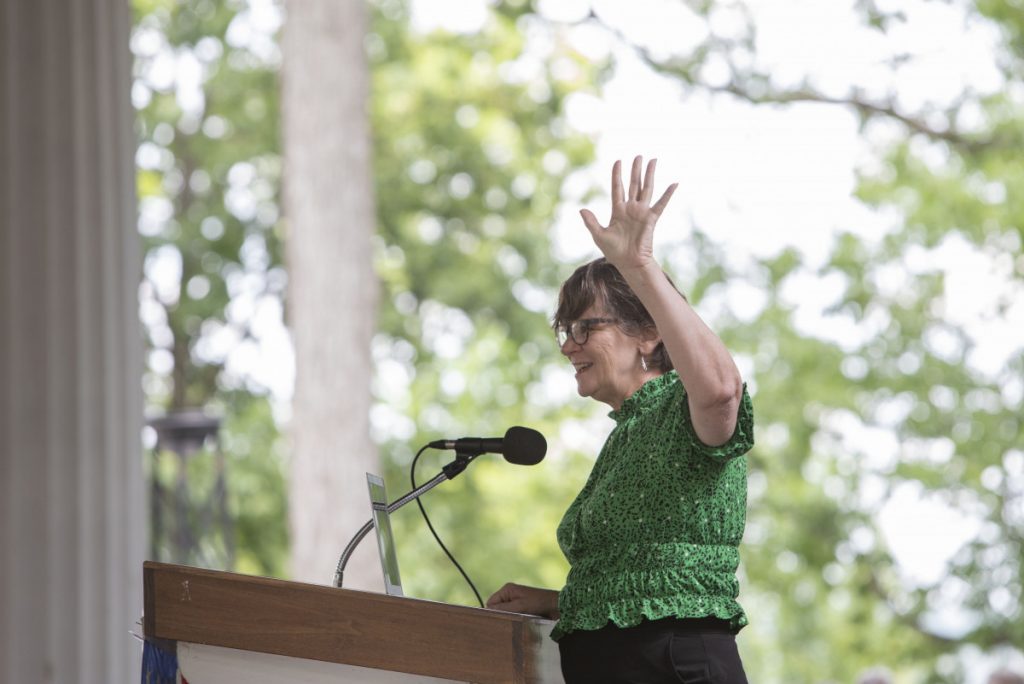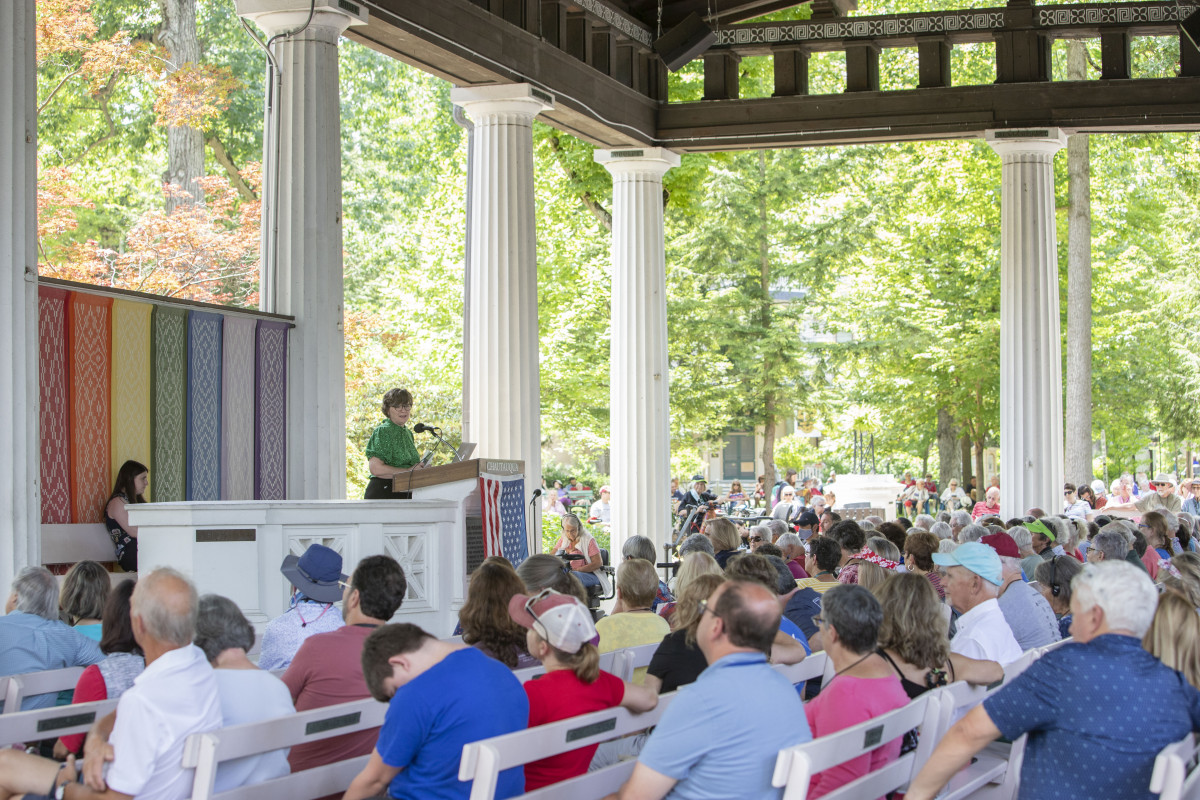After 30 years of working as a pastor, Victoria Loorz had an epiphany: Perhaps more sacredness surrounds humans within nature than within the four walls of a church.
Loorz, Wild Church pastor and eco-spiritual director, opened Week Two of Chautauqua’s Interfaith Lecture Series with the theme of “Reconnecting with the Natural World” at 2 p.m. Monday, July 4, in the Hall of Philosophy. Loorz’s lecture, “Restoring Spiritual Practices to Reconnect with Our Place as Sacred,” was dedicated to the importance of conversation and interconnectedness among all species.
Loorz has founded several transformation-focused organizations that work to integrate nature and spirituality. Beyond this, she has also co-founded the ecumenical Wild Church Network, and she is the founder and director of Seminary of the Wild, a year-long, eco-ministry certificate program.
“(We are) gathered to consider one of the spiritual implications and the foundations of not only this (environmental) crisis, but the role that our religion, our faith and our spirituality plays at this time of deep unraveling,” Loorz said.

Gus Speth, an environmental activist, attorney and former dean of environmental studies at Yale, once said that he “used to think the top environmental problems were biodiversity loss, ecosystem collapse and climate change. But I was wrong. The top environmental problems are selfishness, greed and apathy. To deal with those issues, we need a spiritual and cultural transformation — and we scientists do not know how to do that.”
Loorz shared this with the audience and then asked, “Do we spiritual people know how to do that? This is our challenge.”
With the current and worsening climate crisis, Loorz said, humans must make profound changes to the way they connect, perceive and use the environment that surrounds them.
“I can now say with some deep urgency, what we need can’t be legislated or explained or resolved through a great sermon or a great campaign,” Loorz said. “The very real and concrete changes that our world desperately needs, but desperately resists, will not happen without a profound change of heart.”
Leading the audience into a moment of listening to the natural worship of the trees, leaves, squirrels, birds and all other living things that surrounded the Hall of Philosophy, Loorz told them to draw their focus from their heads into their hearts and enter into a collective prayer of the land.
“(Church of the Wild) is a movement of spirit that a lot of people are listening to. They’re taking seriously a call from spirit and the call from the Earth herself to restore a dangerous fissure,” Loorz said. “Spirituality and nature are not separate. And yet, we’ve kept it separate in our culture. And that’s been a danger to our planet, as well as to our own spiritual and emotional and even vocational vitality.”
Loorz authored and published Church of the Wild: How Nature Invites Us into the Sacred in 2021. She read a portion of the prologue to the Chautauquan audience.
“This is a love story, about a land where the trees talk and the waters croon and the people fall in love with birds, who love them back,” Loorz read. “This is a story about an enchanted forest hiding in plain sight, invisible until, somehow, the veil drops — and what was unseen can suddenly be seen.”
The magic in nature was not always hidden away from humans. Loorz said many of our ancestors understood the true value of the Earth and felt the interconnectedness of themselves to all aspects of the natural world.
“Like all the other wild creatures, (humans) belonged to the land, and they knew it,” Loorz read. “They were part of a grand conversation, a relationship of reciprocity and respect, connecting them with all the other beings and elements of life.”
Continuing to read from the prologue, Loorz spoke on how the divine relationship between humans and Earth began to crumble.
“But there came a time when some of the people could no longer hear the conversation,” Loorz read. “An elixir fell over the poppy fields, like Dorothy entering Oz, causing them to fall asleep. The wax in their ears became hardened, and their hearts pretended that they were happier controlling the world than loving it.”
After the reading, Loorz took a moment to reflect on her childhood and her compulsion to be in nature at a young age.
“I would always find a little secret place (in nature) where I felt safe and somehow seen,” Loorz said. “Even though I didn’t have any spiritual language or words for it, it was in nature that I felt closest to God.”
Many feel a divine connection to the natural world. But all too often, religion and nature are kept separate from one another.
“As I wrestled with this (separation) for several years, seven years ago, I started an experiment as a new way of embodying church,” Loorz said. “I walked out of the chapel doors with the last church where I served as associate pastor, and I started the first Church of the Wild in the sanctuary of the oak trees in Ojai, California.”
Loorz feels a calling to restore the tragic loss of connection through a deep transformation of the heart. She said it is time to begin to treat both humans and nature as more than just a collection of objects.
Loorz quoted Thomas Berry, a Catholic priest and evolutionary theologian, who once said, “We are in trouble because we don’t have a good story right now. We are between stories. The old story is no longer effective.”
Berry portrayed a feeling of desolation and melancholy: “We are talking to ourselves. We are not talking to the river. We are not listening to the river. We have broken the great conversation. By breaking the conversation, we have shattered the universe.”
The true mission of religion, according to Loorz, is reconnection. The word “religion” is a Latin derivative of “religare.” “Re” translates to “again,” and “ligare” refers to ligaments, or connectors. The world “religion” literally translates to “reconnection.”
“When religion loses its purpose of reconnection and colludes with the forces of separation instead, it becomes irrelevant and even irreverent,” Loorz said.
Referring to Berry’s statement, Loorz said that although his ideas were pretty radical, she does not believe he was speaking metaphorically.
“I know that the new, ,emerging story will happen as we restore this great conversation with the rivers and the deer and the trees,” Loorz said. “And he says it will actually help us repair this world, and I think it’s worth trying.”
As humans, people are a part of nature, and those of nature have the capacity to understand each other, even if they are not of the same species. To prove this idea, Loorz pointed to the relationship many humans have with their pets.
To try to learn and digest why nature and religion are so disconnected, Loorz turned to sacred stories in the Old and New Testament. She found out the Bible has called nearly every single leader into the wild.
“I kept looking — Job, Abraham, Isaiah, Josiah, Joshua, Solomon, Hosea, Ezekiel, Jesus, John, Paul — all of them at pivotal moments of their life were called into service, first being called into the wild,” Loorz said. “That’s got to mean something.”
The Hebrew word “bamidbar” translates to “in the wilderness.” Bamidbar comes from the Hebrew root “dabar,” which means “word” or “talk.” This discovery was shocking to Loorz. She theorized that perhaps God knows there is no better place to heal than within nature.
“Seeing the wilderness as an organ of speech, the part of the body of the living Earth that speaks, transforms it to a harsh place of difficulty, into a tender place of intimacy,” Loorz said.
The word “logos,” meaning “discourse” or “reason,” also used to have a different meaning. Loorz said it was once used to describe that everything in nature is full of a kind of divine reason.
But after the death of Jesus the meaning evolved; John’s Gospel used “logos” to describe the divinity of Jesus and Christ.
Until the fourth century, the Greek word “logos” was translated to the Latin word “sermo,” which means “conversation.”
“Sermo indicates not a one-way sermon, like it does now, but a lively discourse and dialogue: a manner of speaking back and forth,” Loorz said.
The Greek translation was suppressed for 1,700 years, and Loorz said the meaning of logos changed once again in the fourth century to an entirely different word, “verbum,” which means a part of speech.
“I believe it was a political decision that went against the grammatical, historical use of the word logos,” Loorz said. “Verbum means just one vocable, the smallest fragment of language that has meaning, a single word. While it doesn’t make grammatical or contextual or even historical sense, it does make a point.”
The new translation shifted Biblical interpretation to discourage conversation and dissenting voices from being heard in the era of the Roman Empire church.
“This version has been suppressed by this 2,000-year-long history of patriarchy. Reviving it is an act of resistance,” Loorz said. “Restoring the original translation of logos has the potential to completely reframe how we understand our interactions with the Spirit, with nature, with ourselves and with others who disagree with us. Imagine what one word change could do.”
Loorz calls for a reorientation of humans’ relationships with the wild, to move away from the apathetic, control-driven, selfish society everyone participates in, “before we succeed in destroying the planet.”
“It’s implausible, perhaps, but the preposterous transformative power of love is at the core of nearly every religion, including my own, and it may just be the only way through,” she said.





